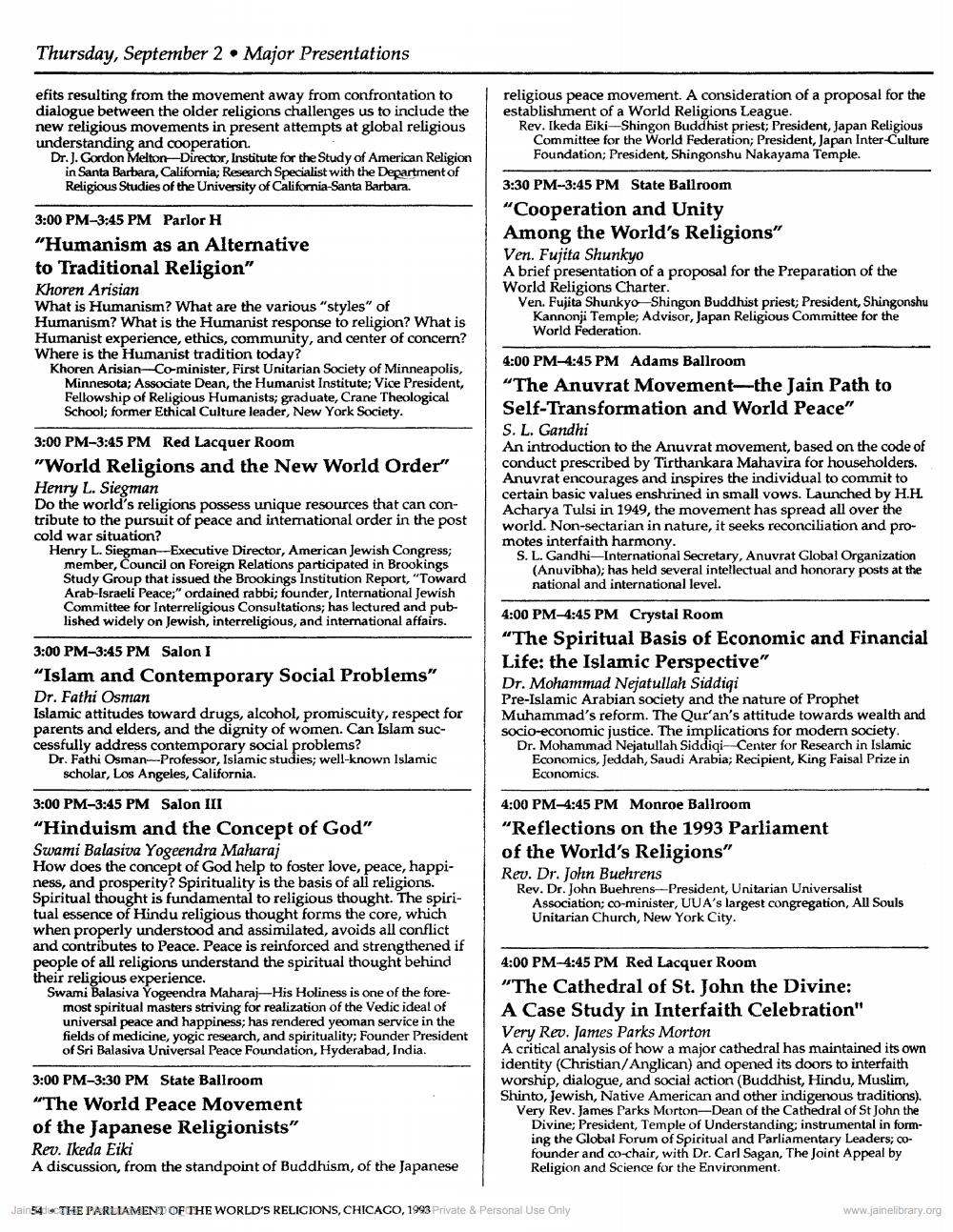________________
Thursday, September 2 Major Presentations
efits resulting from the movement away from confrontation to dialogue between the older religions challenges us to include the new religious movements in present attempts at global religious understanding and cooperation.
Dr. J. Gordon Melton Director, Institute for the Study of American Religion in Santa Barbara, California; Research Specialist with the Department of Religious Studies of the University of California-Santa Barbara.
3:00 PM-3:45 PM Parlor H
"Humanism as an Alternative
to Traditional Religion"
Khoren Arisian
What is Humanism? What are the various "styles" of Humanism? What is the Humanist response to religion? What is Humanist experience, ethics, community, and center of concern? Where is the Humanist tradition today?
Khoren Arisian-Co-minister, First Unitarian Society of Minneapolis, Minnesota; Associate Dean, the Humanist Institute; Vice President, Fellowship of Religious Humanists; graduate, Crane Theological School; former Ethical Culture leader, New York Society.
3:00 PM-3:45 PM Red Lacquer Room
"World Religions and the New World Order" Henry L. Siegman
Do the world's religions possess unique resources that can contribute to the pursuit of peace and international order in the post cold war situation?
Henry L. Siegman-Executive Director, American Jewish Congress; member, Council on Foreign Relations participated in Brookings Study Group that issued the Brookings Institution Report, "Toward Arab-Israeli Peace;" ordained rabbi; founder, International Jewish Committee for Interreligious Consultations; has lectured and published widely on Jewish, interreligious, and international affairs.
3:00 PM-3:45 PM Salon I
"Islam and Contemporary Social Problems" Dr. Fathi Osman
Islamic attitudes toward drugs, alcohol, promiscuity, respect for parents and elders, and the dignity of women. Can Islam successfully address contemporary social problems?
Dr. Fathi Osman-Professor, Islamic studies; well-known Islamic scholar, Los Angeles, California.
3:00 PM-3:45 PM Salon III
"Hinduism and the Concept of God"
Swami Balasiva Yogeendra Maharaj
How does the concept of God help to foster love, peace, happiness, and prosperity? Spirituality is the basis of all religions. Spiritual thought is fundamental to religious thought. The spiritual essence of Hindu religious thought forms the core, which when properly understood and assimilated, avoids all conflict and contributes to Peace. Peace is reinforced and strengthened if people of all religions understand the spiritual thought behind their religious experience.
Swami Balasiva Yogeendra Maharaj-His Holiness is one of the fore
most spiritual masters striving for realization of the Vedic ideal of universal peace and happiness; has rendered yeoman service in the fields of medicine, yogic research, and spirituality; Founder President of Sri Balasiva Universal Peace Foundation, Hyderabad, India.
3:00 PM-3:30 PM State Ballroom "The World Peace Movement
of the Japanese Religionists"
Rev. Ikeda Eiki
A discussion, from the standpoint of Buddhism, of the Japanese
religious peace movement. A consideration of a proposal for the establishment of a World Religions League.
Rev. Ikeda Eiki-Shingon Buddhist priest; President, Japan Religious Committee for the World Federation; President, Japan Inter-Culture Foundation; President, Shingonshu Nakayama Temple.
3:30 PM-3:45 PM State Ballroom
"Cooperation and Unity
Among the World's Religions"
Ven. Fujita Shunkyo
A brief presentation of a proposal for the Preparation of the World Religions Charter.
Ven. Fujita Shunkyo Shingon Buddhist priest; President, Shingonshu Kannonji Temple; Advisor, Japan Religious Committee for the World Federation.
4:00 PM-4:45 PM Adams Ballroom
"The Anuvrat Movement-the Jain Path to Self-Transformation and World Peace" S. L. Gandhi
An introduction to the Anuvrat movement, based on the code of conduct prescribed by Tirthankara Mahavira for householders. Anuvrat encourages and inspires the individual to commit to certain basic values enshrined in small vows. Launched by H.H. Acharya Tulsi in 1949, the movement has spread all over the world. Non-sectarian in nature, it seeks reconciliation and promotes interfaith harmony.
S. L. Gandhi International Secretary, Anuvrat Global Organization (Anuvibha); has held several intellectual and honorary posts at the national and international level.
4:00 PM-4:45 PM Crystal Room
"The Spiritual Basis of Economic and Financial Life: the Islamic Perspective"
Dr. Mohammad Nejatullah Siddiqi
Pre-Islamic Arabian society and the nature of Prophet Muhammad's reform. The Qur'an's attitude towards wealth and socio-economic justice. The implications for modern society.
Dr. Mohammad Nejatullah Siddiqi-Center for Research in Islamic Economics, Jeddah, Saudi Arabia; Recipient, King Faisal Prize in Economics.
4:00 PM-4:45 PM Monroe Ballroom
"Reflections on the 1993 Parliament
of the World's Religions"
Rev. Dr. John Buehrens
Rev. Dr. John Buehrens-President, Unitarian Universalist Association; co-minister, UUA's largest congregation, All Souls Unitarian Church, New York City.
4:00 PM-4:45 PM Red Lacquer Room
"The Cathedral of St. John the Divine: A Case Study in Interfaith Celebration" Very Rev. James Parks Morton
A critical analysis of how a major cathedral has maintained its own identity (Christian/Anglican) and opened its doors to interfaith worship, dialogue, and social action (Buddhist, Hindu, Muslim, Shinto, Jewish, Native American and other indigenous traditions). Very Rev. James Parks Morton-Dean of the Cathedral of St John the Divine; President, Temple of Understanding; instrumental in forming the Global Forum of Spiritual and Parliamentary Leaders; cofounder and co-chair, with Dr. Carl Sagan, The Joint Appeal by Religion and Science for the Environment.
Jain54dTHE PARLIAMENT OF THE WORLD'S RELIGIONS, CHICAGO, 1993 Private & Personal Use Only
www.jainelibrary.org




